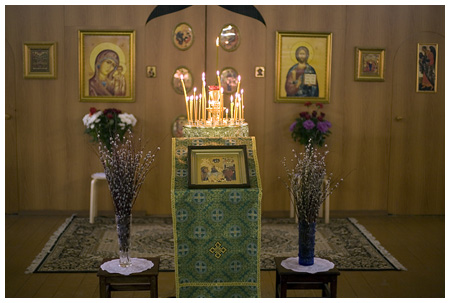Source: St. Mary Orthodox Church
Sermon Preached by Fr. Antony on Sunday, April 1, 2007
In the Name of the Father and of the Son and of the Holy Spirit, one God. Amen.
Glory to Jesus Christ!
The crowd in Jerusalem on Palm Sunday long ago was mistaken. Jesus was not the Messiah they had hoped for. He did not come to overthrow Rome or to establish an earthly kingdom. They would have known that if they had listened carefully and deeply to his words, if they had not been so attached to their own expectations and ideas. You see, they were not attached to Jesus at all. They were attached to their interpretations of Jesus.
It is a common problem. For example, you find the perfect woman to marry and fall deeply in love. Here is the perfect wife: beautiful, intelligent, a great cook, just like mom in all the right ways. All of a sudden after a few months she falls off the pedestal. You look at her and say, “I thought I knew you, but you’re clearly not the person I thought I married.” Well, of course, the problem is that you didn’t really know her at all. You “fell in love” with your idea of her. Of course, before long if not already she may have reached the same conclusion about you.
Here’s a story about my favorite Sufi, Mullah Nasruddin. He was once asked why he never got married. He said, “I went to Damascus and found a wonderful woman: smart, beautiful, almost perfect, except she couldn’t cook! So I went to Alexandria and found another wonderful woman: smart, beautiful, a great cook, but she was poor. Then I went to Baghdad and found the perfect woman…only, we never married.” “Why not?” the inquirer replied. “Because I was not perfect enough for her!”
The crowd was so in love with the popular ideas about the Messiah that they couldn’t recognize him when he came. They were so attached to their notion of what the Messiah must do to satisfy them they could not see that Jesus was going to go above and beyond their wildest expectations. Why defeat Rome when death is the real problem?

Of course, we often find ourselves in the same dilemma. We project our expectations onto people, events and things and find ourselves frequently disappointed. The old saying is, “no expectations, no disappointments.” There is another one that says, “there are only two disappointments in life, not getting what you want and getting it.”
There is a solution to this problem and it is to let go of our attachments to our own ideas of how things should be and take a long, hard look at how things really are.
Those of you who come to St. Mary’s regularly may think I have become a broken record, but I am convinced that the secret to the spiritual life lies in a simple rule, that is, we need to open our eyes wide to the reality in each and every moment that presents itself to us.
Again the Church reinforces this message in the Troparion of the Feast of Palm Sunday, “Today the Holy Spirit has brought us together.” Today, right now, this moment. We will miss Him if we are not focused on the here and now. When the Divine Liturgy invites us to “lay aside all wordly cares” it means that it is alright to live entirely in the moment, to be so completely focused on the moment that nothing else matters. And you know what? Nothing else does matter. The Holy Spirit has brought us together. Could anything else be more important?
Thankfully, we can carry this same message into our lives outside the Liturgy.
An unfortunate tidbit of Medieval western theologizing has crept into our Church, that is the notion that there are seven sacraments. Actually, Orthodox theology, does not agree. We believe that all of life is a sacrament. There is really only one sacrament: Life itself. Every meal becomes a Eucharist; every relationship a blessed “matrimony”; every tear, a new baptism; everyone called to minister the love of God undergoes the blessing of holy orders; every invocation of the Holy Spirit, a real chrismation; every intimate sharing of self between friends and loved ones, confession; every gentle touch, every heartfelt prayer, becomes holy unction. Every single moment carries in it the seeds of heaven.
How beautiful life becomes when every moment is recognized for what it is: divine!
In this way we are gradually transformed into God’s likeness. His image lies within us all, but we must consciously become conformed to his likeness. Each moment we are called to conform ourselves to the image of God in which we have been made by detaching from all that is false and nurturing all that is good.
“Let the dead bury the dead,” Jesus said of the past. “Do not worry about tomorrow,” Jesus said of the future. About this moment he says, “Follow me!”















